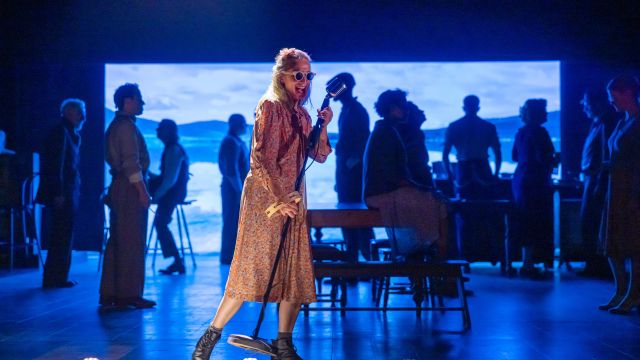Girl from the North Country
1934. Duluth, Minnesota, in the depths of The Great Depression. Young would-be lovers, Kate (Elizabeth Hay) and Gene (James Smith) break up: she’s leaving town. They argue, regret things they said, get angry, and Gene lies. Playwright Conor McPherson writes this direction in the text of his musical play:
She turns away. GENE watches her. As the music starts and they sing, they could dance and even kiss. We see what their souls are doing despite everything that’s just been said.
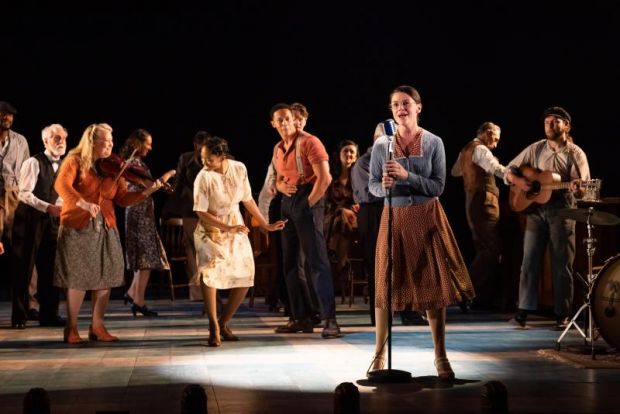
And the song is the heartbreaker, ‘I Want You’ from Blonde on Blonde. That’s the way Bob Dylan’s songs function in Girl from the North Country. The idea for a play came initially from Tristan Baker and Charlie Parsons of Runaway Entertainment, and they chose Conor McPherson to come up with a concept or a story idea. McPherson did, and once Dylan had approved McPherson’s idea, McPherson received 40 albums in the post. He chose (no doubt not easily) twenty-two songs, ranging across 1963 to 1980, which fitted and influenced his story. Dylan imposed no restrictions and no directives. But this is no ‘jukebox musical’.
There are songs of regret, wistful songs, angry songs, but underneath all of them there is a yearning for what could be better, or what could have been better. There are big numbers too when the actors become musicians in merging and mixing groups. McPherson is Irish but his idea, left field but inspired, was to tell intertwined stories of two families and to set those in a rundown boarding house in the Depression – which provides the jeopardy and the plot device for all the characters. What better setting for songs of regret and yearning.
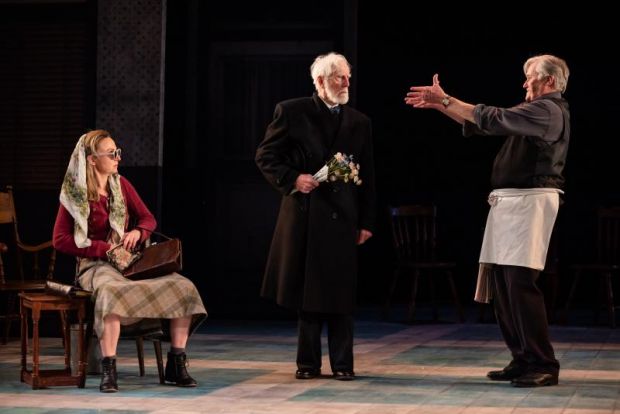
McPherson has captured too the vocabulary and speech rhythms of 1934 Depression America – or it certainly plays like that. The result is a powerful, blackly funny, and engrossing play in which Dylan’s songs are integral to the storytelling.
The Duluth boarding house cum flophouse is run by Nick Laine (Peter Kowitz), endlessly harassed, trying to hold things together under the burden of a huge debt, caring for his early-onset Alzheimer’s wife Elizabeth (Lisa McCune), and adopted now pregnant black daughter Marianne (Chemon Theys). Nick’s exasperated by his twenty-something unemployed son Gene, who wants to be a writer – and his not too hidden affair with widow Mrs Neilsen (Christina O’Neill). She’s one of the lodgers, waiting on an inheritance; she’s been waiting quite a while. The destitute Bourke family – Mr Burke (Greg Stone), Mrs Burke (Helen Dallimore) and their 30-something intellectually handicapped son Elias (Blake Erickson) – are lodgers too. Mr Burke’s business was ruined and now the family is on the run, or hiding out…
Mr Perry (Peter Carroll) the 70-something cobbler, wants to marry pregnant Marianne – encouraged by her stepfather Nick… And one stormy night, sleazy, unctuous Bible salesman Marlowe (Grant Piro) stumbles in, by chance in company with Joe Scott (Elijah Williams), an Afro-American boxer, not long out of prison… Who will survive? The Narrator, supposedly the voice of sanity, but as flawed and wounded as the rest, is Dr Walker (Terence Crawford). (Mr Crawford does seem to be channelling Garrison Keilor of The Prairie Home Companion radio show, but that’s quite appropriate here.)
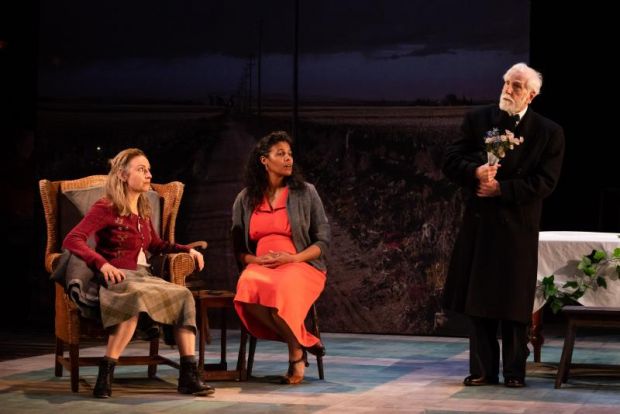
Most of these characters are just a little crazy, on edge, desperate through grief and despair, aware that there may be no future, at least for them. Strangely, it is Elizabeth, who’s really is ‘crazy’ – what a touching detail when her hand-me-down cardigan is misbuttoned - who is the insightful realist – but alone, so alone. In a bold stroke, it’s Elizabeth who sings ‘Like a Rolling Stone’ – and Lisa McCune, in yet another peerless performance in every aspect, makes you see that song in a whole new way and brings you to tears - such is Elizabeth’s loneliness.
But the entire cast (and ensemble members Samantha Morley, Liam Wigney, Grace Driscoll, Tony Cogin and Laurence Coy) are all wonderful – perfectly cast and hooking us into their characters’ fragile hopes, evasions, shattered pride, and rage.
Conor McPherson is also the director, here working with a local cast, never losing his grip on the drama he’s created, smoothly moving all these characters around a big stage, sometimes using them as iconic silhouettes upstage. A range of locations – including Lake Superior – are suggested by striking and economic means via Rae Smith’s design, Mark Henderson’s lighting, and Simon Baker’s sound design.
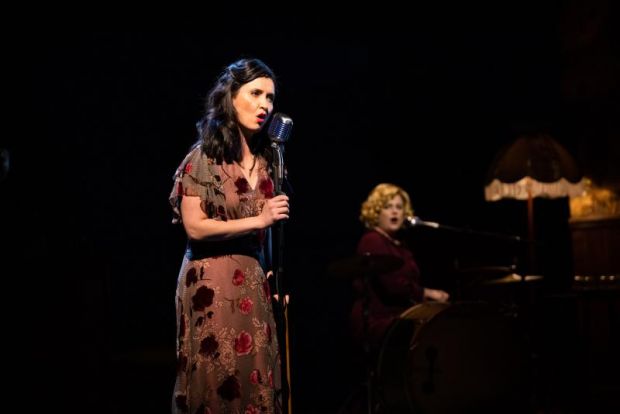
If I have a slight reservation – and I may well be alone in this – it’s whether or not Dylan’s lyrics are best served by the ‘musical theatre’ makeover they get from Simon Hale’s orchestration and arrangements. But then we are so used to the direct simplicity of Dylan’s own voice (despite the numerous cover versions of his songs) that a sometimes-lush orchestration and vocal backing can lose the lyrics if not the emotion. We still see ‘what [the characters’] souls are doing despite everything that’s… been said’.
After the show, a friend remarked, ‘I didn’t expect it to end like that.’ Well, McPherson is an Irishman and a grownup and his play and his characters end as they should – a risky decision nowadays when we too are ‘yearning’. This play with songs is closer to, say, Ragtime than to Come From Away, but what happens feels genuine and real, and we are moved by the struggles of these characters, and that is the ‘uplift’ we get from Girl From the North Country.
Michael Brindley
Photographer: Daniel Boud
Subscribe to our E-Newsletter, buy our latest print edition or find a Performing Arts book at Book Nook.

